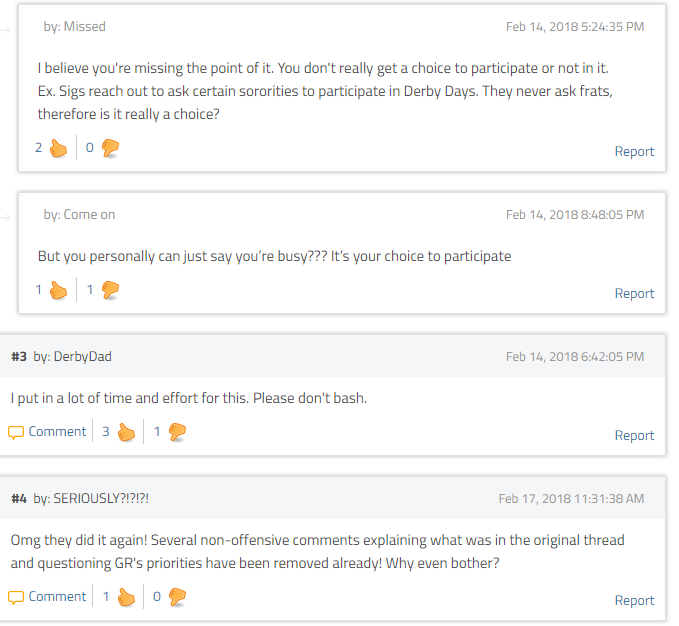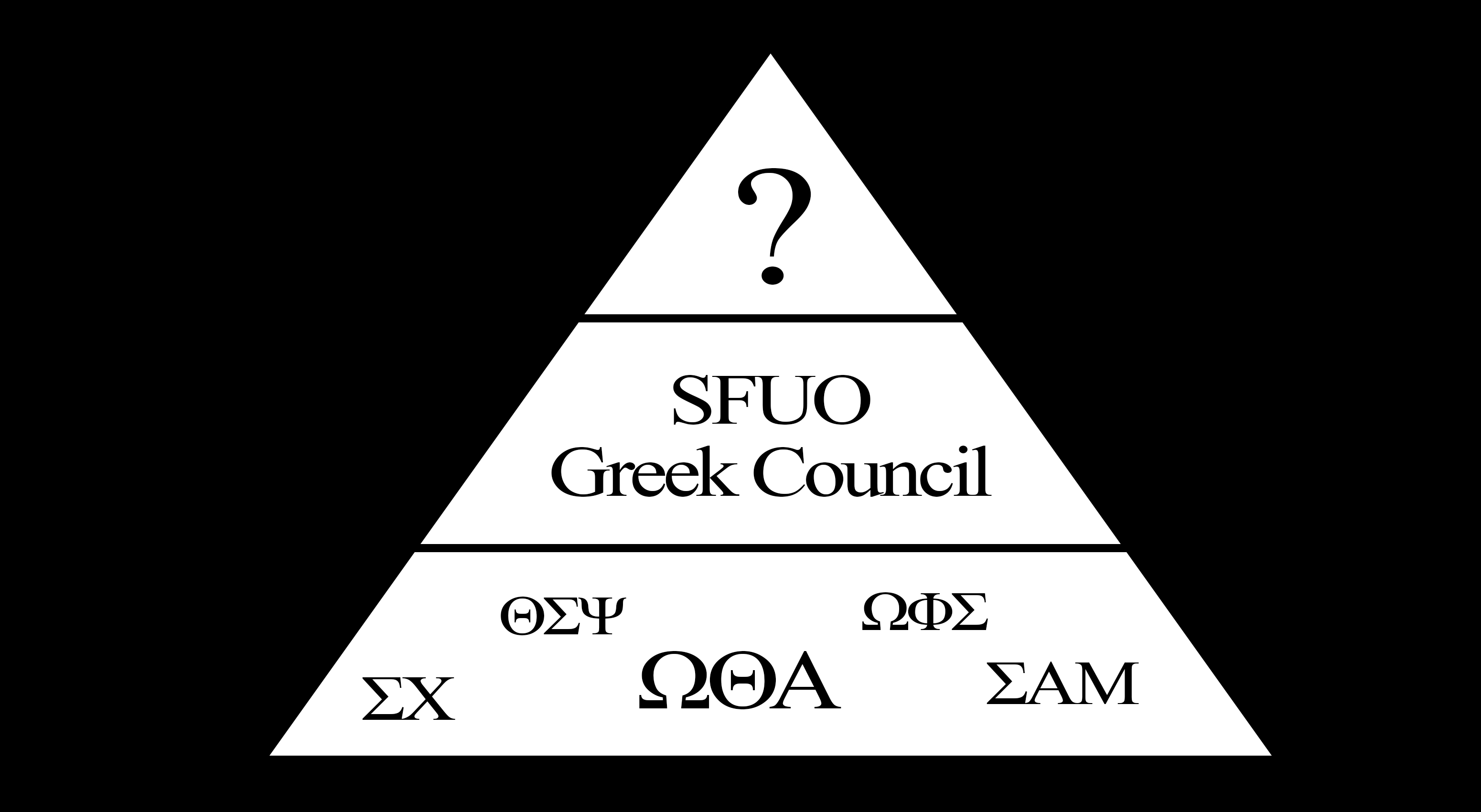Allegations of sexual assault, harassment taint U of O Greek community
You’re fresh out of high school, and looking forward to making new friends at your home for the next four or more years, the University of Ottawa. What better way to go about that than by joining a sorority? After all, you get to network, make lifelong friendships, and raise money for numerous important causes. At least, that’s what they tell you.
Greek life on campus isn’t all that it’s cracked up to be, and while any organization will tell you that they promote philanthropy, diversity, and a sense of community, what they fail to mention are the overtones of rape culture.
While you’re listening to all the great reasons why being a sister of such-and-such sorority is a dream come true, across the hall, students from fraternities are recruiting new members by pointing your way and saying, “see those girls? Do you think they’re hot? We party with them all the time.”
Former members of Greek life organizations have boldly brought forward their stories about the toxic environment within the community, that leads to cases of alleged sexual assault going unnoticed and unaddressed. Some students have chosen to remain anonymous for safety reasons. Their identities have been privately confirmed by the Fulcrum.
Allegations against Omega Theta Alpha
According to the individuals we spoke with, members of the local U of O fraternity Omega Theta Alpha have allegedly perpetrated sexual assaults dating back to 2016.
The current president of the Omegas, Jonathan Gawek, refused to comment on the allegations despite multiple requests by the Fulcrum, stating, “our main values are integrity and respect and I will not open the door to any sort of slandering of the Omega Theta Alpha fraternity or any other member groups of the greek community.”
This isn’t the first time allegations of sexual harassment have been directed towards the Omegas, with Omega alumnus Bart Tremblay participating in comments alluding to sexual violence in 2014 against Anne-Marie Roy, president of the Student Federation of the University of Ottawa (SFUO) at the time. Tremblay was a pledge of the fraternity when he made the comments, and was dropped after the Fulcrum published an article detailing the comments, only to become a brother the following semester.
Other allegations against the fraternity include instances of being roofied at mixers, and having a male who lived in the same house as the fraternity members participate in a Facebook group chat suggesting sexual violence against a woman who claims to have then been sexually assaulted, and threatened by him.
Another ex-sorority sister discussed the administrative roadblocks and backlash she faced within the Greek life community after she shared her own experience with sexual assault. According to the student, she was ostracized by members of her sorority for speaking out against the overtones of rape culture that she had witnessed.
While the student took steps to protect herself like filing an informal complaint against her alleged Omega assailant with the human rights office at the U of O, she says it wasn’t enough.
She also says she spoke with other victims of the Omega Theta Alpha member who assaulted her, only to learn that her assault was preventable, alleging that there were three others who previously pointed out his actions to the president of the fraternity, only to be told that no action would be taken against him as the fraternity “overcompensated on the last rapist by kicking him out.”
“That’s when it sunk in that my victimization could have been completely avoided,” she said, adding, “the girls who called themselves my sisters completely overlooked that, and they let me get raped. Because if I had known, I wouldn’t have been fucking even near that person, and that’s just what is so devastating to me is that these women didn’t look out for me, this community doesn’t look out for you.” While she clarified that she does not blame anyone for the actions of her abuser, the student shared that she does believe her assault could have been prevented and that the Greek life community could benefit from education workshops.
“If men and women were properly educated on how to be bystanders as well as the fundamentals of consent I and so many other men and women wouldn’t have to fight tooth and nail every single day for ourselves,” she said.
How did it come to this?
All organizations are managed by a single governing body, the University of Ottawa Greek Council (UOGC), which, along with the sororities and fraternities is a registered club with the SFUO.
The U of O has nine sororities and three fraternities, all with unique constitutions that limit behaviour for members. A former member of a sorority says that the rules regulating sororities are much stricter than those that govern fraternities.
For example, while sororities are forbidden from drinking in their letters representing their organization and drinking during the recruitment process, fraternities have no such limits. According to former members of other Greek life organizations, these disparities are what contribute to the toxic environment within the community that lead to larger issues like sexual violence.
Greek life contains many patriarchal elements that contribute to the problematic culture of these groups, according to former sorority members.This is encapsulated in events like the Greek Olympics, a sporting event hosted by the UOGC and Carleton University’s Greek Council. The event is billed as a philanthropic event, raising money for the Children’s Hospital of Eastern Ontario (CHEO).
While the charitable aspect of the event is frequently highlighted by community leaders, sources say that the Greek Olympics is in reality a weekend-long party. One of the most anticipated parts of the weekend, according to past participants, is a private Facebook page made prior to the event with the sole purpose of insulting the organizations attending.
This is an annual tradition, and derogatory comments like “you’re a failed abortion,” have made repeat appearances, as well as fat shaming, gay jokes, and rape jokes. The page also specifically mentions that pledges are not allowed to see it, claiming that if anyone were to show the page to those outside of Greek life, they would face consequences.
This is not an issue exclusive to the U of O, with online forums like greekrank.com that exist, allowing students to rank various organizations around the world anonymously as well as post discussion threads which have targeted individuals in the past.

Most recently, a post about another event called Derby Days was deleted from the website. Derby Days is another philanthropic event hosted every spring by Sigma Chi, a U of O international fraternity.
According to Meagan Tapia, president of the sorority Theta Sigma Psi, the event, which started on March 3 this year and ran until March 10, features sororities competing against each other to raise the most funds for CHEO. Tapia explained that competitions are theme based, and subject to change every year, “but are generally things like air bands, bake sales, artistic competitions, and scavenger-type games.”

However, a former sorority member who has attended the event claims that it also features a sexualized dance competition, where girls are judged based on their level of perceived attractiveness, and that members of the fraternity are referred to as ‘Derby Dads.’ She also mentioned that the sororities who compete to raise money for CHEO aren’t credited and the donation is given in the fraternity’s name.
In this same vein, sources also spoke about the pressure within the community for sororities to support fraternity events, regardless of whether or not those fraternities have allegations of sexual assault against them. According to a former sorority member, members are expected to show up to fraternity events, parties, and mixers if their organization receives the “privilege” of being invited.

“If we were to question,‘this is very patriarchal, why are we doing this, why can’t we have our own joint fundraiser?’ everyone would be like ‘it’s something that everyone does, all the other sororities do it, how would it make us look if we didn’t do it too?’” she said.
Greek organizations also have a standards chair, which acts as a judiciary body and works through a strike system. Examples of strikes include not dressing appropriately for an event, in which case the standards chair will contact the individual and tell them what to wear, or not meeting specified requirements such as attending social events or meetings.
If this happens multiple times, a meeting would take place, and the organization may administer consequences such as being put on probation, which means not being able to attend social events, followed by suspension, and ultimately being dropped by the organization.
Despite all of these rules, there is no uniform policy on sexual assault. Every organization that we spoke to told us the same thing: that they can only speak for their own organization, and that they comply with the university’s policy for sexual violence prevention, Policy 67b.
Lydia Talajic, president of the sorority Omega Phi Sigma explained that “although there is nothing specific to sexual violence, there is a zero-tolerance bullying or harassment policy set in place for member-to-member relations,” as well as safety measures like “sober sisters,” taken for mixers where alcohol is consumed, where two sisters remain sober to make sure the rest of the sisters are safe. This is not unique to Omega Phi Sigma, as McKenna Bebee, president of Nu Sigma Pi said that her sorority follows the same rule.
Certain international organizations have sexual violence prevention policies within their charters like the U of O chapter of the fraternity Sigma Alpha Mu. These charters have strict regulations that each chapter has to follow, including an orientation and training videos pertaining to sexual violence, according to Sigma Alpha Mu president, Aliab Eman.
What’s been done, and whose responsibility is it anyway?
So far, any intervention has been internal. Per Tapia, “an all encompassing Greek initiative has yet to be orchestrated. However, various organizations, inclusive of both sororities and fraternities, have taken it upon themselves to participate in initiatives and workshops,” referencing her own sorority’s mental health and sensitivity workshops, as well as bystander intervention training, noting a third coming up called the “1 in 5” workshop.
Bebee also mentioned working with Tapia’s sorority to participate in a workshop, spearheaded by one of its members, where organizations like Draw the Line and the White Ribbon Campaign were invited to speak on campus.
It appears that both the U of O administration and our student federation are ignorant to the conditions currently facing members, past and present, of Greek life organizations. While both the university and the SFUO have made significant progress when it comes to paper pushing, as seen in the updated survivor based sexual violence policy, these changes don’t seem to translate in the context of actual assault.
Patrick Charette, director of institutional communications at the U of O commented on the school’s policy in a statement to the Fulcrum, saying that “our policy on the prevention of sexual violence applies to all students, no matter where an alleged incident could have happened,” adding that all clubs are mandated by the SFUO.
Meanwhile, Leila Moumouni-Tchouassi, vice-president equity of the SFUO stated that “the SFUO is not super involved with the frats and sororities,” and that “we are here to support them when they need…but do believe clubs should be allowed to function with minimal interference from the SFUO unless otherwise required.”
The question that remains then, is whose responsibility is it to regulate Greek life on campus?
Many sorority presidents pointed the Fulcrum towards the UOGC to answer questions regarding the potential for a uniform sexual violence prevention policy, however the council did not respond to a request for comment in time for publication.
It seems that there needs to be a more comprehensive system of oversight for the Greek organizations on campus, and regardless of club status, the university administration needs to do something to hold fraternities and sororities accountable for their actions—these are students attending the U of O, after all.
They can start by addressing the existence of rape culture that exists within their ranks by creating stronger regulations, and making sure they are enforced.
As long as these organizations are registered clubs under the SFUO then there is a responsibility among both the SFUO and the university admin to better manage these organizations. But the onus also needs to be placed on the organizations to recognize there is a problem of sexual violence, re-examine and develop internal policies, and listen to those who come forward with their stories.





